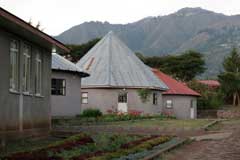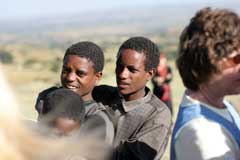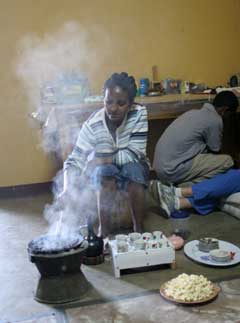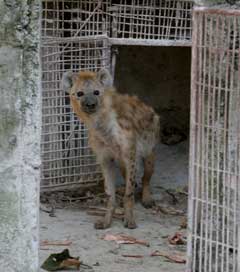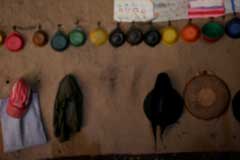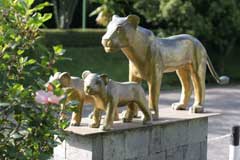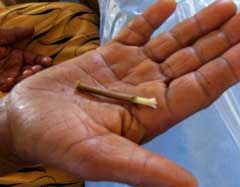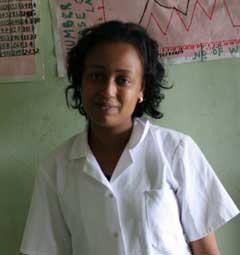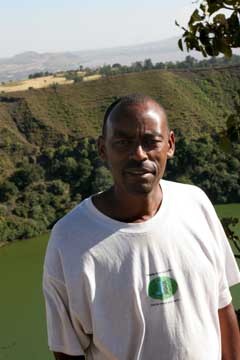Ethiopia
2006
~
FAQ
Frequently Asked Questions

Where did you sleep and what did you eat?
We were well cared for by the folks at Project Mercy. We stayed in dormitory type circular housing (patterned after tukuls) with hot showers, sheets on very comfortable beds, and electricity. We ate in a private dining hall and were served delicious food that was a fusion of western and Ethiopian cuisine.
Did you ever feel unsafe?
No. Security was not an issue. We generally stayed together as a group and were never off by ourselves. Occasionally a few of us walked between the hospital and Project Mercy school compound (a mile or so) and some went for hikes in the surrounding hills with a guide. Around town (Butijera) we always were part of a group. It is noteworthy, though, that the Project Mercy school compound is guarded at night by armed guards!
Did you have a favorite photo, and why?
This photograph of two young boys captures something special about many of the people we came in contact with. These were shepherd boys who came to watch us (ferenjis) as we hiked around the volcanic lake. They were two among about twenty or thirty. There is a friendliness in the way they are looking at us, them hanging on each other, their smiles and inquisitiveness, their close proximity to Peggy, the blond hair in the lower left corner blowing in the wind, the Great Rift Valley in the background: all make this a "summation" photo.
What was the weather like?
Yetebon is close to the equator (9 degrees north latitude) but is at a high elevation (8,000 feet). The weather was temperate - 70s and 80s in the day, 50s and 60s at night. There were no bugs to speak of, although we did take anti-malarial drugs and carried DEET with us. We were there in the dry season and it was generally dry. We had mostly sunny skies, although there were clouds some evenings to give us a sunset show. Those who live there tell us it is quite nice from a climatalogical point of view almost all year 'round.
What is a coffee ceremony?
We were privileged to be invited into the home of one of the teachers at Project Mercy for a coffee ceremony. This event is carried out by this young couple on a weekly basis whether there are visitors or not - it is part of their real life, not just for show. Raw, unroasted coffee beans are roasted until they are black and smoking on a very hot pan over a charcoal fire. They are then pounded into a fine grind using a metal mallet. The grinds are then placed into water in a special flask which is itself heated on the same charcoal fire. The coffee is steeped until it reaches perfection, then it is served in small cups with popcorn as a side dish. The usual ceremony involves taking three small cups each with time for conversation and visiting.
Did you see much AIDS?
The incidence of AIDS in the rural area in which we spent time is about 5 to 10%. We did see patients with AIDS, often in combination with Tb or some other infectious problem. One man in a coma who was brought to the clinic by friends on a pallet was near death and most likely had AIDS as his underlying condition. I saw a young teen boy with Tb who probably had AIDS. We treated him for another infection and recommended that he get treatment at a hospital.
Did you have any fun or sightseeing?
We had a daytrip to a volcanic lake on the edge of the Great Rift Valley. We also went to a "zoo" in Butijera that was maintained by a little eye hospital (the association between the zoo and the clinic was never made clear). The zoo had baboons, porcupines, and a hyena. When Frank announced the outing to the zoo with the hyena, I got quite a laugh from the group by asking, "Is it a petting zoo?" We also had the opportunity to take some hikes to a nearby waterfall, but since we were starting at 8,000 feet of elevation I passed. We also had a day of shopping in Addis - some of us thought that qualified as "fun." At the end of the trip we had a retreat/debriefing time at a beautiful lake between Yetebon and Addis.
Did anything funny happen?
Most medical humor does not translate well into a non-medical setting, so I need to be very careful here. One thing that continually brought a smile to my translator Meski and my face was seeing patients try to get in position for an exam, despite our best attempts at giving instruction. Rarely had anyone been to a doctor before so they had no idea how to get on the table or how to lie down. We saw people climb on the table as if they were going to stand on it, they squatted upon it, they lay face down, and they lay on their side - just about anything except lying face up in the middle of the table. Next time a pictorial guide might help. (Like I said, most medical humor does not translate well...)
Did you get to visit inside a tukul?
Several times the opportunity presented itself to visit tukuls. They all were basically the same: dirt floor, mats to sleep on, no furniture, "decorations" on the wall at the roof line. They were dark, smoke filled afairs, shared with animals (cows, sheep, goats) which were separated from the people be a low fence. The people we met were always gracious and friendly. One woman was roasting some kernels of corn for her children's lunch and promptly offered us a portion. Another had tea set out for a late morning tea break with family or friends and when we showed up unannounced she not only invited us in but offered us tea.
Did you see any lions?
Only on the city buses in Addis and outside the Hilton Hotel in Addis.
Did anyone get sick?
A few of us got traveler's diarrhea which was easily treated with Cipro. It seemed to me that the bacteria in this part of the world were particularly sensitive to the antibiotic as it generally cleared up in 12 to 24 hours. Five of the twelve of us never used any Cipro.
Did you bring toothbrushes to pass out to people?
Yes, we brought, literally, thousands. However, we didn't pass very many out because we quickly realized that the people living in tukuls have no way to keep them clean and also they already use a locally grown twig as a toothbrush quite successfully. The dental hygiene education included a suggestion to people to use the twig to clean the inside part of the tooth as the outside.
Who was your favorite person on the trip?
We all got along well and each played a distinct and important role. I can't imagine the trip without each of us being there. However, that being said, there was one person that I relied upon perhaps more than others: my translator, Meskerem. She was a delightful young woman from Addis, a nurse, a great help in my clinical work, and fun to be with. Her name means "September" - which is her birth month. She had never been outside Addis and seemed as surprised as me by the conditions of the people we encountered.
How did you all get around?
Project Mercy provided wonderful support for us. They provided a driver, Paulus, and a van, administrative support, and lots of pretrip work in the villages we held our clinics in.
Did you feel guilty in returning home to so much?
No, but during the retreat time I pondered this question and was directed to Psalms 16, where it tells us that God "has given me my portion and my cup." I interpret this to mean that God has given me my portion, He has given others their portion, and He has given the Ethiopian people theirs. There is much about God that we do not understand, including this. However, we do not have to feel guilty about it.
Is God still teaching you anything in the aftermath of this trip?
 |
| Missy |
The most striking aspect of the lives of these people for me was the degree of suffering and loss that is part of the daily life cycle for so many. Infant death, neonatal death, maternal death, and premature death of young adults was commonplace. It was the rare person that I met who had not been touched by the early death of a loved one - or of many loved ones! Then I think of the degree of pain and suffering that I (and my wife and my daughters) experienced with the loss of our own daughter Missy, and I still cannot quite put it all together: Our suffering was so great - almost to the breaking point - yet these people experience loss after loss seemingly without experiencing the same degree of despair as me (us). I still struggle with that.

